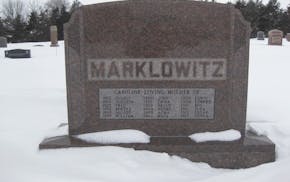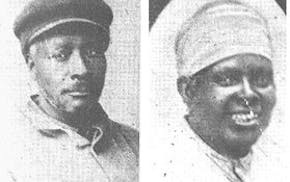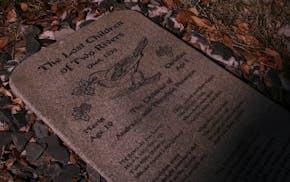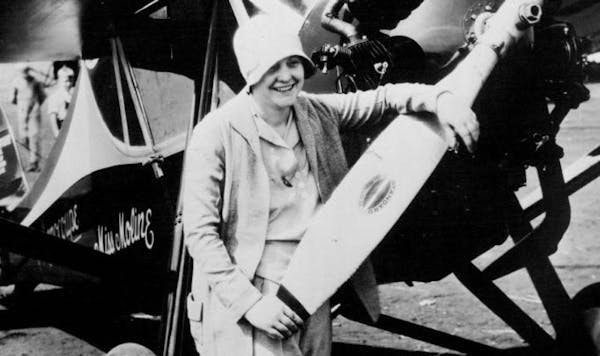The white-haired labor leader in the wire-rimmed glasses was getting ready to call the convention to order at St. Paul's Municipal Auditorium. William Mahoney hoped to inject a worker-driven third political party into the United States' two-party landscape.
In many ways June 17, 1924, would become a defining moment in Mahoney's largely forgotten but noteworthy political career. He'd climbed from a pressman into a labor champion and union newspaper editor. As president of Minnesota's popular Farmer-Labor Party, he was poised to take the party nationwide.
Now, after six months of planning, the auditorium was filled with delegates whom the St. Paul Daily News described as "farmers just in from the fields, labor organizers with their coats off, girl workers with knickerbockers, fat old women and moustached foreign-looking men."
But just as the show was about to begin, Mahoney discovered that someone had stolen his gavel. "So I had to go in the scrap heap and get this," he told the Farmer-Labor Progressive Federation Convention. Banging a piece of junk wood, he got the meeting started.
The convention quickly collapsed into disarray. Charismatic Wisconsin Sen. "Fighting Bob" La Follette, hand-picked to challenge President Calvin Coolidge, had ghosted the assemblage. A Communist faction connected to Soviet leaders took control of the convention, forcing La Follette to renounce it and back out — and leaving Mahoney to suffer an embarrassing political setback.
Today, nearly a century later, you can find a real gavel belonging to Mahoney on a bookcase in the front hall of Jim McCartney's house in St. Paul's Merriam Park neighborhood. From 1919 to 1947, Mahoney lived with his wife of 66 years, Stella, in the same two-story stucco house that McCartney, his wife, Martha, and their three kids have called home since 1992.
The gavel, presented to Mahoney by the St. Paul Vocational School in 1932, was rescued from an antique store by a friend of McCartney's. Over the years, neighbors mentioned the house's mayoral connection to McCartney. Once, during a remodeling project, he found Mahoney's name on a 1930s True Detective magazine.
"His name would keep cropping up now and then, repeatedly piquing my interest," said McCartney, a public relations agent and former St. Paul Pioneer Press business reporter, who turns 69 on March 26. "As I dug into him, Mahoney turned out to be a far more interesting and significant character than I'd guessed."
McCartney chronicled Mahoney's topsy-turvy career in a recent issue of Ramsey County History magazine (tinyurl.com/MahoneyStory). Mahoney, he said, "was an ardent socialist, a big hero of the local labor movement, the editor of the Union Advocate, essentially the founder of the Farmer-Labor party, and for one brief moment, the orchestrator of an event" — the 1924 convention — "that was at the center of national and international politics. I found his story to be a fascinating one."
But the story isn't just about Mahoney's failures. He picked himself up and won the St. Paul mayor's race at 63 in 1932 on his third try, knocking off incumbent Mayor Gerhard Bundlie and becoming the city's "First Laborite Mayor," as the Minneapolis Star put it.
Born in Chicago in 1869, Mahoney was one of six children and spent his childhood on a Kansas farm before finding work as a telegraph operator. He earned a law degree in Indianapolis before moving in 1905 to St. Paul, with Stella and their daughter Aurelia, to work as a pressman.
An avowed Socialist, Mahoney lost a run for Congress in 1914 after arguing that workers should control government and that railroads, mines, banks and factories should be nationalized to shed what he called "the rotten rule of the rich." He lost bids for mayor in 1920 and 1922, but he won in 1932 by pledging "to divorce underworld influence from city government" and reduce gas and electric charges.
According to McCartney, the crime pledge backfired. Gangsters flexed their muscles during Mahoney's time as mayor — desperate to cash in on bank robberies and kidnapping before the mayor could clean up the corruption that had given them safe haven for years. He lost his bid for re-election in 1934 by 249 votes.
"Crime peaked in St. Paul not because Mahoney allowed it — like previous mayors and police chiefs did — but because he was going after it," McCartney said.
Mahoney died from a coronary blockage at 83 in 1952. A front-page obituary in the Minneapolis Star called him a "veteran trade union and political leader."
McCartney's article draws similarities between Mahoney's era and today: growing wealth disparities, political polarization and union resurgence.
"I think we can use Mahoney's story to explore what we are going through now and how we can drive political and economic change," retired Macalester College labor history Prof. Peter Rachleff told McCartney.
Curt Brown's tales about Minnesota's history appear every other Sunday. Readers can send him ideas and suggestions at mnhistory@startribune.com. His latest book looks at 1918 Minnesota, when flu, war and fires converged: strib.mn/MN1918.

St. Cloud professor's book paints nuanced look at enslaved woman freed in Minneapolis

Paying overdue tribute to his grandmother, a Minnesota farmer recarves family history

Civil War officer brought formerly enslaved family to Minnesota

Two Minnesota children in 1870 were lost in the woods, but not to history


